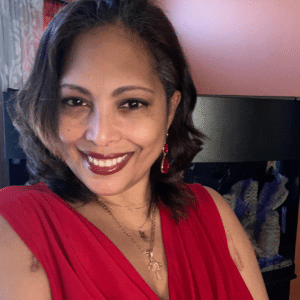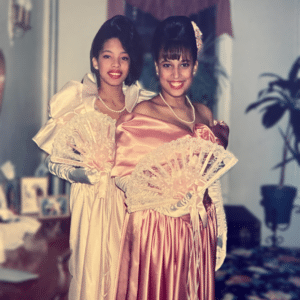Lea este blog en español AQUÍ
Lea este blog en español AQUÍ
The goal of the Hispanic Outreach Promoting Equity (HOPE) Project is to understand how race and ethnicity have impacted the experiences of Hispanic individuals with sickle cell disease (SCD). Through the HOPE project, we learned what types of teaching tools the Hispanic community needs to educate themselves about available treatments for SCD, patient journeys, COVID-19 vaccination, and more. As a part of this project and our continuing effort to increase Hispanic representation in the SCD space, this blog and future related publications will serve to highlight the unique stories of these individuals, and to promote awareness about their lived experiences and the challenges they face.
Sick Cells sat down with Nilda Navedo, a sickle cell warrior, to hear her story.

Nilda Navedo, a sickle cell warrior
Nilda Navedo, 44 years old, was born and raised in New York in the Washington Heights neighborhood. She is a sickle cell warrior, advocate, and educator. She has a Bachelor of Science in Business Administration and currently lives in Charlotte, North Carolina.
About her family, she says,“My mother is from the Dominican Republic, and my father is from Puerto Rico. They are both carriers of the sickle cell gene. I have an older sister who is a carrier, and I was born with the disease, type SS. My parents were not aware they were carriers of the gene, and two children were born with sickle cell anemia from my mother’s family: my cousin, Vanessa, and me.”
During her childhood, Nilda tells, there was not a lot of conversation happening about SCD:
“Growing up, I did not understand my illness,” says Nilda. “I grew up in a time when a problem within the family remained within its walls. My family knew I was born with a chronic disease, but I was simply a sickly child to the community. There was no awareness, due to pride and privacy.”
When Nilda was 18 years old, she lost her cousin, the only other SCD Warrior she had known. Nilda mentions that her cousin’s passing was a painful but important moment in her life:
“She was the only one I knew who shared my experiences. We were cousins but, in my heart, we were sisters. She died at the age of 20. I was two years younger, and it was also my graduation date…The experience was a painful one, but it taught me two lessons: not only is life a precious gift, but it is also a chance to live each day as if it would be your last.”
The loss of her cousin led Nilda to write a living will and medical directive at 19 years old. It also prompted her to become an advocate for SCD.
Nilda also describes her relationship with physical pain, and how it was influenced by her upbringing, and older generations in her family. . Nilda shares: “My grandmother significantly influenced how I deal with sickle cell through the faith and holistic approach… I have a [home remedy] recipe for every complication to every major organ or symptom. And yes, the jokes about Vicks VapoRub are real: I rub Vicks on my nose and the sole of my foot before going to bed. […] I believe the mindset of my culture forced me to develop a relationship with pain. I endured pain for many years as I was not introduced to pain medication until I was 19.”
One story she shared highlighted this: “It is common to have a ‘Quinceañera.’ Still, our family celebrated my birthday by taking us to Venezuela to visit the burial site of San Gregorio Hernandez, known as the poor people’s doctor and seen as a holy figure. Miniature statues of prominent Catholic Saints are on my nightstand as a reminder of my faith.”

Nilda with her cousin Vanessa
Nilda has made an impact through her advocacy work. In 2006 she was invited to share her experiences as a SCD warrior with the North Carolina state legislature. As a result of her testimony, a resolution was passed, urging Congress to provide more funding for the Sickle Cell Treatment Act. Additionally, she has served on the North Carolina Council on Sickle Cell Syndrome for three governors.
Nilda’s mission is to use any outlet available to educate the Hispanic community about SCD:
“In 1996, I was crowned as the 1st ‘Reina Latina’ Charlotte, NC. I used my platform to reach out to the Hispanic Community and raise awareness on a seldom-known illness like mine. The question my community often asks me is ‘Is there a cure?’ I often share why I have not found a match, and I express the need for our community to donate blood and register with Be the Match. It is then that I can have a chance to find a cure.”
Nilda’s work in advocacy and education continues today. She currently runs a WhatsApp group chat dedicated to providing support and education about SCD for warriors and caregivers. The group has over 90 members from all parts of Latin America.
At the end of our conversation, Nilda shared her life philosophy with us. “The support I have from my family and the community in Charlotte led me to achieve my goals despite hardship. I was raised in an environment where we do not dread our sorrows. Behind the success, there is sacrifice. Marc Anthony said it best in “Vivir Mi Vida.” His lyrics depict the very nature of my upbringing.”
To learn more about Be the Match click here
Written by Karla Sintigo, Research and Community Outreach intern for Sick Cells. Second year medical student at University of Illinois – Chicago
Published January 3, 2022
